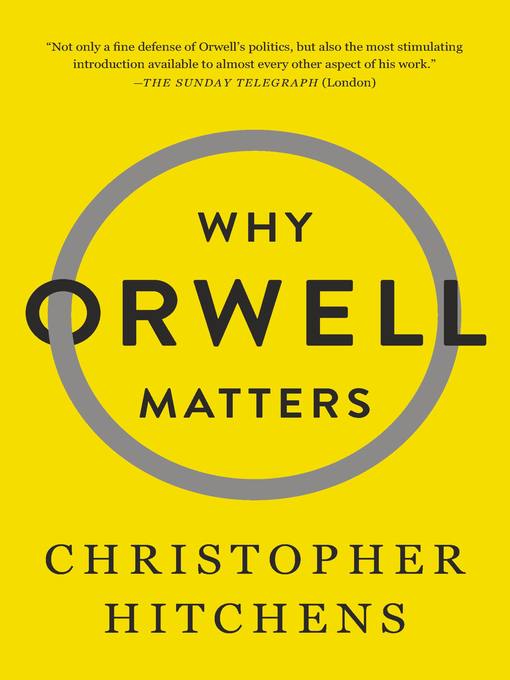
Why Orwell Matters
کتاب های مرتبط
- اطلاعات
- نقد و بررسی
- دیدگاه کاربران
نقد و بررسی

August 19, 2002
Vanity Fair
and Nation
contributor Hitchens passionately defends a great writer from attacks by both right and left, though he also refutes those fans who proclaim his sainthood. George Orwell (1903–1950), a socialist who abhorred all forms of totalitarianism, was, as Hitchens points out, prescient about the "three great subjects of the twentieth century:" imperialism, fascism, and Stalinism. In all things, Orwell's feelings were every bit as visceral as intellectual, and Hitchens devotes some of his best writing to describing Orwell's first-hand experiences with empire in Burma. It was there that he learned to hate racism, bullying and exploitation of the lower classes. "Orwell can be read," notes Hitchens, "as one of the founders of... post-colonialism." Orwell's insights about fascism and Stalinism crystallized in Spain, while he was fighting in the Civil War. Hitchens offers an excellent analysis of the writer's women, both real (his wives) and fictional, to show that the feminist critique of Orwell (that he didn't like strong, brainy women) may be unfair, though Hitchens also points out what feminists have ignored: Orwell's "revulsion for birth control and abortion." Hitchens brilliantly marshals his deep knowledge of Orwell's work. Fans of Orwell will enjoy Hitchens's learned and convincing defense, while those unfamiliar with Orwell may perhaps be induced to return to the source. (Oct.)Forecast:Hitchens has made a splash with recent books
(Letters to a Young Contrarian and
The Trial of Henry Kissinger). Basic is banking on similar success with a 30,000 first printing.

November 1, 2002
Far from being an ordinary biography, this small volume is an in-depth investigation of the essential George Orwell-"the heart on fire and the brain on ice." Hitchens recognizes that Orwell was more than the author of 1984 and Animal Farm. He was a keen critic of Nazism and Stalinism and didn't soften his pictures of them to sell books. His analysis of the grave inequities of those two forms of government is sufficiently acute to apply to the early 21st century's political spectrum. While claiming that Orwell "requires extricating from a pile of saccharine tablets and moist hankies [as] an object of sickly veneration and sentimental over-praise," Hitchens, a columnist for Vanity Fair and the Nation, asserts that in contrast to his many contemporaries who wrote about the era's political issues (e.g., Louis MacNeice, Stephen Spender, and Cecil Day Lewis), "it [is] possible to reprint every single letter, book review and essay composed by Orwell without exposing him to any embarrassment"-a remarkable feat, indeed. The only problem with this study is that it assumes that the reader already knows that Orwell conscientiously overcame his early anti-intellectualism, his dislike of the "dark" people of the English Empire, and his squeamishness about homosexuality-all to become a great humanist. Thus, it is written for readers who have already done their homework. Recommended for large libraries with extensive political science holdings.-Charles C. Nash, Cottey Coll., Nevada, MO
Copyright 2002 Library Journal, LLC Used with permission.

October 15, 2002
George Orwell is one of those rare writers who are both artistic and fluent in world events and politics. His shrewd, indelible novels are continually read and discussed all around the world, but Orwell, uncompromising and independent to the point of penury, didn't reach this pinnacle without adversity or controversy. Hitchens, an author and columnist for the " Nation" and " Vanity Fair, "whose combativeness and peppery eloquence are backed by wide-ranging erudition, reasserts Orwell's significance in this impassioned yet pinpoint assessment of the man, his writings, and their reception, which has been by turns sloppily negative or excessively positive. Hitchens dissects in fresh and insightful detail the "extraordinary salience" and ongoing relevance (hence the term " Orwellian") of Orwell's complex subjects--imperialism, fascism, Stalinism, nuclear weapons, environmentalism--and parses the prescience that inspired Orwell to invent the expression " cold war" and foresee many of the global conflicts we're currently experiencing. Moving neatly from political commentary to literary criticism and biography, Hitchens clarifies all that Orwell accomplished and, by extension, affirms literature's unique and essential powers.(Reprinted with permission of Booklist, copyright 2002, American Library Association.)

























دیدگاه کاربران